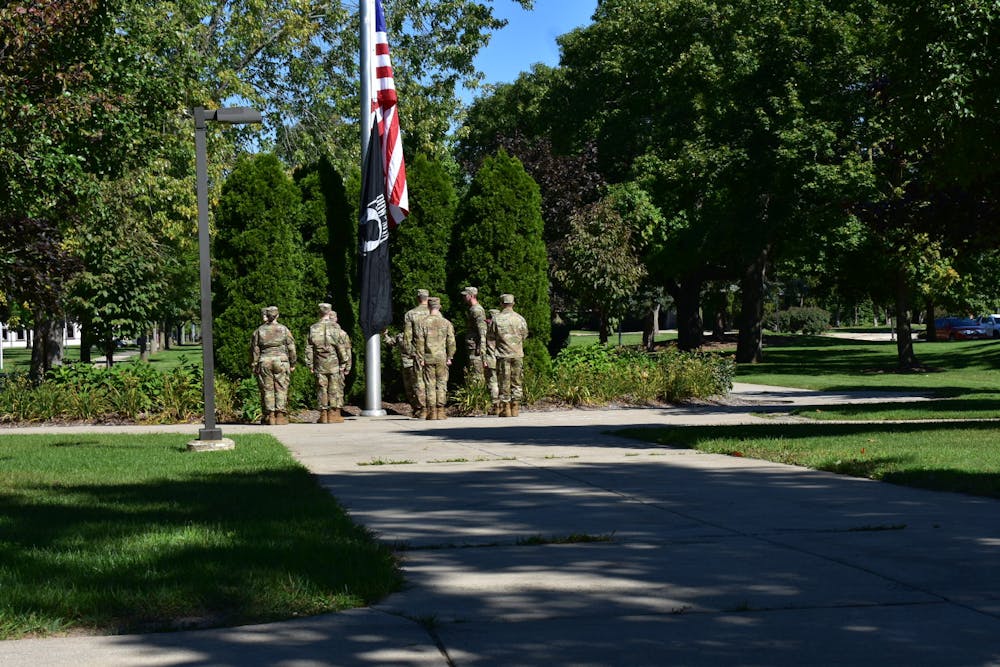'The least we can do': POW/MIA flag raising on Remembrance Day
The ongoing search for POW/MIA is recognized at CMU with the raising of a flag and a presentation at the seal
On a warm, sunny September day at the Warriner Seal, a somber silence took hold, as men and women in full military uniformed march in step to the flagpole. The star-spangled banner waved merrily overhead, with the Central Michigan University flag just beneath.
After a moment they began to lower the flags, carefully removing the CMU flag and hoisting in its place a recognizable black-and-white banner, bearing a silhouette head and the phrase “you are not forgotten.”
As it reached the top, fluttering with the day’s slight breeze, the sound of the army's bugle call, "Taps," rang out from a lone trumpeter beneath a tree.
In less than half an hour, the participants commemorated the sacrifices of thousands and honored decades' of determined work to hold America accountable for soldiers who become prisoners of war or missing in action. Many remain unaccounted for, as their loved ones at home wait without closure, according those in attendance.
This was the raising of the Prisoners of War/Missing in Action (POW/MIA) flag, a yearly tradition founded in 2020 by CMU’s Philosophy, Religion and Anthropology department, in conjunction with the Reserve Officers’ Training Corps (ROTC) branch on campus. It is held on the third Friday of September, coinciding with America’s POW/MIA Recognition Day.

Duane Kleinhardt, director of the campus Veterans’ Resource Center. Kleindhardt, one of the event’s organizers, is glad that CMU is able to commemorate the day.
“After 37 years in the military, you learn a lot about the sacrifices made by (the POW/MIA)," Klienhardt, a veteran himself, said.
He said he attributes a great deal of the event’s creation on campus to Professor Hope May of the Philosophy department, stating that much of this was her work.
“It’s the least we can do,” May said.
She quoted the phrase that appears in brochures and handouts distributed at the event, citing a "duty to remember."
“Some 81,000 people from World War II to (the present remain) unaccounted for," May said.
The Department of Defense does have a specialized agency tasked with finding the whereabouts or remains of those who have been designated MIA or POWs, known as the Defense POW/MIA Accounting Agency (DPAA); however, the event made it clear this wasn't always the case.
One brochure given at the event depicted a timeline and story of the relentless effort by military families, who had been left without closure and in emotional and often financial distress due to the lack of certainty regarding their loved ones’ whereabouts.
These families, led by Sybil Stockdale, the wife of a POW, formed the League of POW/MIA Families. They became a formidable force bent on holding their officials to laws dictated by the third Geneva Convention regarding the humane treatment of POWs, and the right of their families to know the truth, according to the brochure.
Then-President Richard Nixon proclaimed the week of March 26 through April 1 of 1972 as a “National Week of Concern for POW/MIA.” Through the years, dates of recognition have been added, leading to then-President Ronald Reagan designating the third Friday of September as National POW/MIA recognition day.

Lt. Col. Ryan Greening, a professor of military science, reiterated the value of remembering those who were lost fighting for the country.
“As a veteran … it is important to me and to those who didn’t come back.” A sign beside him, bore the phrase “though not here, their sacrifice is not forgotten."
May said it’s about more than the POW/MIA themselves.
“War impacts families,” she said. The family those men and women leave behind may not find closure as their father, mother, son, daughter, husband or whoever they may have been remains in the uncertain state of missing in action.
Though the government now conducts searches for those who went missing during war, the effort for accountability is still very much ongoing. The DPAA, tasked with finding POW/MIA, was founded only eight years ago, and according to a congressional mandate, is required to perform 200 identifications a year.
With the latest update from the DPAA in May of 2023 reporting over 81,000 POW/MIA still remaining from the U.S since WWII, activists believe there is work to be done to make sure America’s Army can live up to its ever-present policy: never leave a man behind.
For more information and resources, go to dutytoremember.com.







